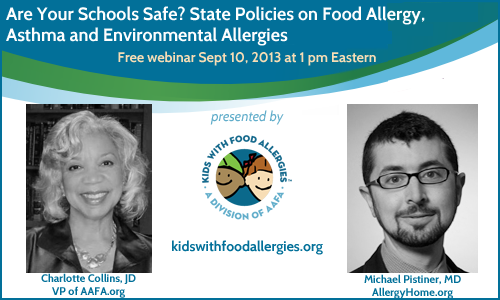Join AAFA Vice President of Policy and Programs, Charlotte Collins, J.D., and KFA Medical Advisory Team Chair Michael Pistiner, MD, MMSc, to learn more about your state's requirements for issues affecting those with asthma, food allergy and environmental allergies. The discussion will detail how you can learn more about policies in your state ranging from whether students can carry their epinephrine auto-injectors, to what your state's nurse-to-student ratio is, to whether schools require parent notification for pesticide applications on campus. See how you can use AAFA's 2013 State Honor Roll report to understand how your state is faring compared to others, and how advocates and policy makers can use this report as a blueprint to improve policies nationwide.
This FREE webinar is made possible by an unrestricted educational grant provided by Mylan. A watch & win giveaway will be provided by Enjoy Life Foods. All webinars presented by KFA are recorded and archived for your convenience. Even if you cannot attend live, you can register to receive a follow-up email with a link to the video and resources.
Webinar: Are Your Schools Safe? School Policies on Food Allergy, Asthma and Allergies



Comments (2)